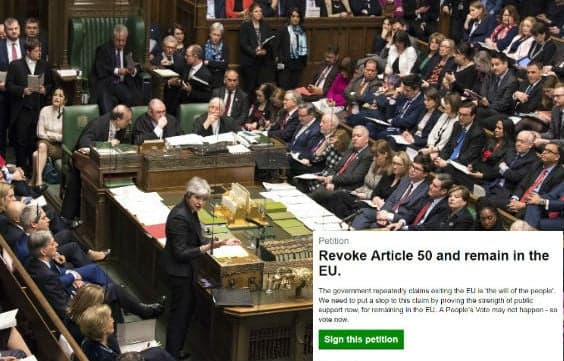Cancel Brexit petition heads towards SIX MILLION signatures

A petition set up last week that calls for the British government to cancel Brexit and stay in the EU by revoking Article 50 had garnered almost six million signatures on Wednesday.
The online petition was set up on the parliament site shortly after Theresa May addressed the British public in a TV appearance in which she blamed MPs for the Brexit chaos.
By the next day it had rocketed past the one million signature mark and has kept on rising.
By Wednesday morning, thousands of people were still signing up to show their disapproval of the Prime Minister and their desire to remain part of the EU.
The total was at 5.83 million by 10am and was expected to pass the six million mark on Wednesday or Thursday.
According to officials at the House of Commons the petition had the highest rate of sign ups ever.
The petition was shared widely on British Facebook groups across the EU and thousands have signed from France, Germany and Spain.
The petition titled: 'Revoke Article 50 and remain in the EU' reads: "The government repeatedly claims exiting the EU is 'the will of the people'. We need to put a stop to this claim by proving the strength of public support now, for remaining in the EU. A People's Vote may not happen - so vote now."
While the Conservative government has said it will not be cancelling Brexit or revoking Article 50 in order to respect the result of the 2016 referendum, parliament will hold a debate on the issue on Monday.
"Revoking Article 50, and thereby remaining in the European Union, would undermine both our democracy and the trust that millions of voters have placed in Government," said the official statement.
The petition was started by Margaret Georgiadou, who says she has received death threats as a result.
Detractors claim it is full of false signatures, however officials have said that fake ones are being removed unless they can be verified via email.
British PM Theresa May was still holding out that her deal with the EU would get the backing of the British parliament in a third vote, but MPs were also set to cast votes on Wednesday on various other options.
Britain is set to leave the EU on April 12th unless May's deal is passed or the government can come up with a plan B to convince Brussels to accept a longer delay.
You can sign the petition here.
Comments (8)
See Also
The online petition was set up on the parliament site shortly after Theresa May addressed the British public in a TV appearance in which she blamed MPs for the Brexit chaos.
By the next day it had rocketed past the one million signature mark and has kept on rising.
By Wednesday morning, thousands of people were still signing up to show their disapproval of the Prime Minister and their desire to remain part of the EU.
The total was at 5.83 million by 10am and was expected to pass the six million mark on Wednesday or Thursday.
According to officials at the House of Commons the petition had the highest rate of sign ups ever.
The petition was shared widely on British Facebook groups across the EU and thousands have signed from France, Germany and Spain.
The petition titled: 'Revoke Article 50 and remain in the EU' reads: "The government repeatedly claims exiting the EU is 'the will of the people'. We need to put a stop to this claim by proving the strength of public support now, for remaining in the EU. A People's Vote may not happen - so vote now."
While the Conservative government has said it will not be cancelling Brexit or revoking Article 50 in order to respect the result of the 2016 referendum, parliament will hold a debate on the issue on Monday.
"Revoking Article 50, and thereby remaining in the European Union, would undermine both our democracy and the trust that millions of voters have placed in Government," said the official statement.
The petition was started by Margaret Georgiadou, who says she has received death threats as a result.
Detractors claim it is full of false signatures, however officials have said that fake ones are being removed unless they can be verified via email.
British PM Theresa May was still holding out that her deal with the EU would get the backing of the British parliament in a third vote, but MPs were also set to cast votes on Wednesday on various other options.
Britain is set to leave the EU on April 12th unless May's deal is passed or the government can come up with a plan B to convince Brussels to accept a longer delay.
You can sign the petition here.
Join the conversation in our comments section below. Share your own views and experience and if you have a question or suggestion for our journalists then email us at [email protected].
Please keep comments civil, constructive and on topic – and make sure to read our terms of use before getting involved.
Please log in here to leave a comment.